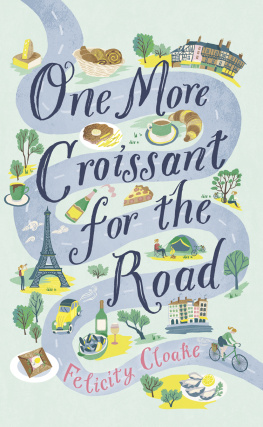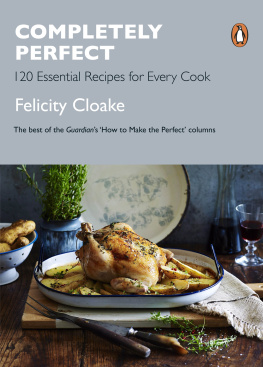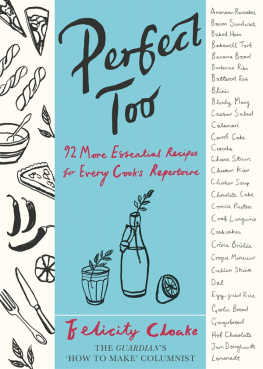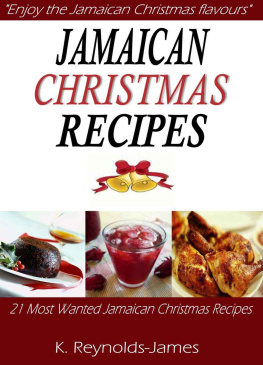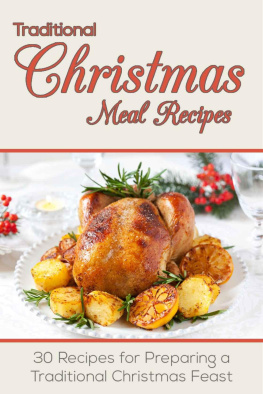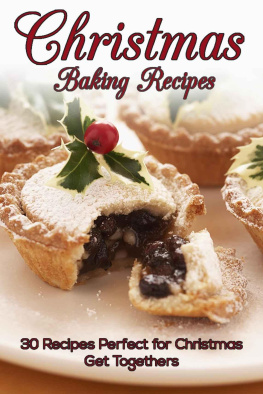ABOUT THE AUTHOR
Felicity Cloake is a journalist and food writer from London. She writes for the Daily Mail, Metro and Fire & Knives magazine and has a weekly column in the Guardian. She was named Food Journalist of the Year and won the New Media of the Year Award at the 2011 Guild of Food Writers Awards. Her first book, Perfect, is published by Penguin.
www.felicitycloake.com
Penguin Shorts
We believed in the existence in this country of a vast reading public for intelligent books at a low price, and staked everything on it
Sir Allen Lane, founder of Penguin Books.
The first affordable quality books for a mass audience were brought out by Penguin nearly eighty years ago. And while much has changed since then, the way we read books is only now becoming different. Sometimes it is still only a hardback or paperback book that will do. But at other times we prefer to read on something either more portable a dedicated reading device or our smart mobile phone or more connected, such as a tablet or a computer.
Where we are or how much time we have often decides what it is we will read next.
Penguin Shorts and Penguin Specials are designed to fill a gap. They are short, they are original and affordable, and they are written by some of todays best and most exciting writers. And they are available only in digital form.
Written to be read over a long commute or a short journey, in your lunch hour or between dinner and bedtime, these brief books provide a short escape into a fictional world or act as a primer in a particular field or provide a new angle on an old subject.
Always informative and entertaining, Penguin Shorts and Penguin Specials offer excellent writing that you can read on the move or in a spare moment for less than the price of a cup of coffee.
Perfect Christmas Day
Some calming words on the subject of Christmas dinner
Christmas dinner is perhaps the one meal of the year where even the most relaxed cook feels the pressure of perfection and, although few menus can be more familiar, its probably the one we all feel the least confident about. The context, of course, can be stressful small children high on pilfered tree decorations, squabbling relatives proffering hindering help but, rest assured, the cooking really shouldnt be.
Remember, a turkey is nothing but an outsized chicken, and who feels daunted by the idea of cooking that for a Sunday roast? If you do, dont panic the boring, but tried-and-tested key to producing any such meal is planning ahead. And by investing in this ebook, rather than frantically raiding the internet on Christmas morning, youve already shown promising aptitude. (If, of course, youve purchased this on Christmas morning, well, Im sure well muddle along just fine, as long as youve remembered to get the shopping in.)
On the other hand, although Christmas dinner is just another roast, in many ways, of course, its much more than that. For many of us, the meal is a jumble of much-loved and fiercely defended family rituals, and, as such, it occupies a very special place in our often jaded hearts. Even if you feel bound by no such ties of tradition, its an undeniably delicious menu. And, as the food writer Annie Bell points out in her book Gorgeous Christmas, how can anyone say theyre bored with Christmas pudding and roast turkey when they only come round once a year?
So, back to planning. First things first, work out what youve got time to make cranberry sauce, mincemeat and mulled wine syrup can all be prepared weeks in advance, and the stuffing and mince pie pastry can be made and frozen ahead of the big day. Nut roast, bread sauce, trifle and pigs in blankets can be done the night before and kept cool overnight you can even peel the potatoes and parsnips a few hours early as long as you keep them in acidulated water (water with a hefty squeeze of lemon juice). What Im trying to say is, calm down, youve got loads of time.
Do all the shopping, then make a time plan. This sounds nerdy, but its remarkably effective at soothing the nerves. Decide when you want to sit down to eat, and work backwards from there, bearing in mind the turkey should rest for at least half an hour before carving. When making your shopping list, remember to check on levels of basics like foil, oil and washing-up liquid. Its pretty irritating to get halfway through a recipe only to realize youre going to have to go out again in search of a vital ingredient, but when the shops are closed, its a disaster.
Unless your nearest and dearest are criminally cack-handed, dont be afraid to assign jobs most people like to be useful at Christmas, even if its only so they can bask in glory when the gratitude is handed out and make one of those jobs to ensure that, as the most important person in the house, you are never without a drink, be that sherry, champagne or just a nice cup of tea. Then take a deep breath, think happy thoughts, and make sure you dont get lumbered with the washing up.
Mulled wine
Its that time of year when you go into a pub for a long, dry gin and tonic, and come away with a queasy stomachful of warm, sweet wine. Indeed, the impossibility of ignoring the siren call of those heady spices is a matter of scientific fact, despite the widespread knowledge that generally, mulled wine isnt actually very nice.
The thin broth that sits sourly on the bar in many pubs in the run up to Christmas is a sad comedown for a drink originally designed to show off the wealth and largesse of a medieval household. Mulling is not just a cunning excuse to serve laughably cheap wine to your unfortunate guests although it does have that as a fringe benefit no, theres a real art to it.
Certainly the recipe given in The Forme of Cury, a cookery book published in about 1390, contains exotica not often found in those dreaded mulled wine teabags. As well as cinnamon, ginger, cloves, nutmeg and cardamom, it calls for long pepper, marjoram and grains of paradise although the spykenard de Spayn eludes me. A little online research suggests using rosemary instead, but Im not sure this substitution can be blamed for the flavour of the end result: I can see this stuff being deployed with some success against the plague.
Perhaps medieval tastes were different: indeed Mrs Beeton, Delias Victorian great-grandmother, gives a recipe which, as well as sticking to fairly standard ingredients, produces something approximating to a modern, if rather bland mulled wine although I would like to go on record with the fact that water has no place in a festive punch.
Delia, queen of the modern British Christmas, doesnt disappoint with her citrus-heavy recipe for a kind of winter sangria particularly if you take her up on the optional two tablespoons of Grand Marnier and then add a bit more for the sake of festive cheer. Jamies idea of making a spicy syrup base, rather than burning off all the alcohol while attempting to infuse the wine with flavour, is a stroke of genius, however and it also allows you to get most of the work out of the way in advance, leaving you well prepared for unexpected seasonal visitors, or, indeed, an unexpected Sunday night craving for hot wine.
Dale DeGroff, widely acknowledged to be the worlds greatest living bartender, according to his book The Craft of the Cocktail, gives a recipe for Scandinavian glgg, which, unlike the tame glhwein sold at kitschy German Christmas markets, has a rather fearsome reputation. The cocktail king takes his recipe from Los Angeles Scandia club, whose members included Marilyn Monroe, Marlene Dietrich and Gary Cooper, so what it lacks in authenticity it makes up for in celebrity provenance. The soggy almonds and liberal amounts of fiery vodka lead me to suspect that starlets are not discriminating drinkers.


